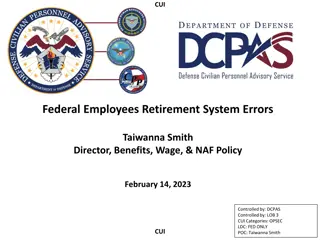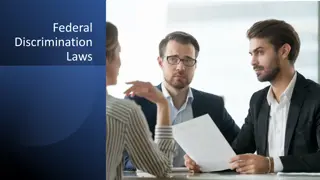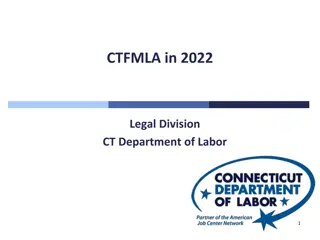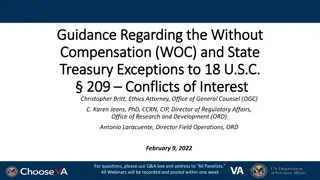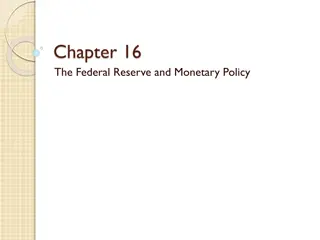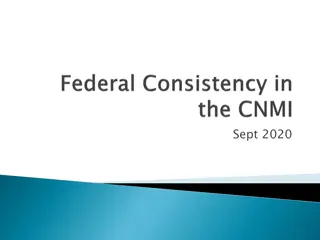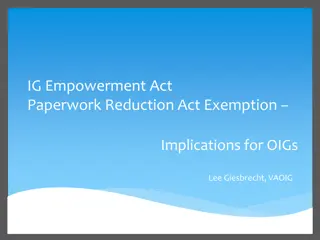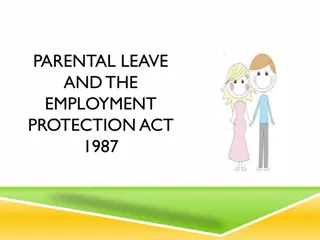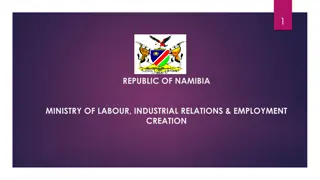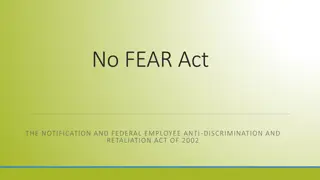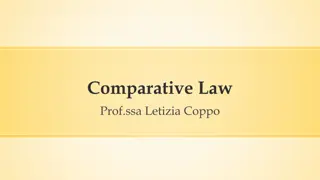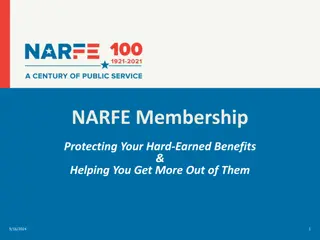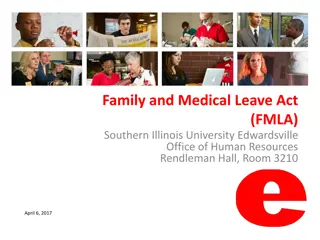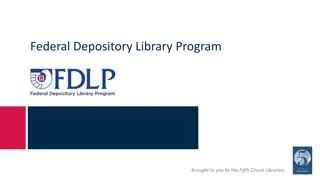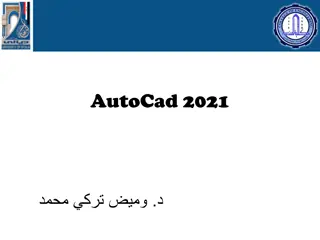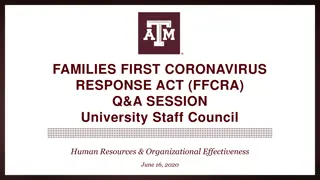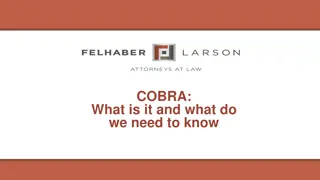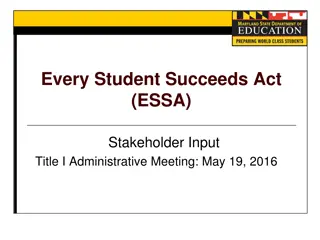Understanding the Hatch Act: Guidelines for Federal Employees
The Hatch Act regulates federal employees' participation in partisan political activities. It categorizes employees into two groups: Less Restricted and Further Restricted, each with specific limitations. Certain intelligence and enforcement agencies, specific positions, and all employees have varying levels of restrictions. While some activities are permitted, others are prohibited. Awareness of these regulations is crucial for federal employees during the election season.
Download Presentation

Please find below an Image/Link to download the presentation.
The content on the website is provided AS IS for your information and personal use only. It may not be sold, licensed, or shared on other websites without obtaining consent from the author. Download presentation by click this link. If you encounter any issues during the download, it is possible that the publisher has removed the file from their server.
E N D
Presentation Transcript
The 2020 Election Season: What Every Federal Employee Needs to Know about the Hatch Act Ana Galindo Ana Galindo- -Marrone Chief, Hatch Act Unit Chief, Hatch Act Unit Erica Hamrick Erica Hamrick Deputy Chief, Hatch Act Unit Deputy Chief, Hatch Act Unit U.S. Office of Special Counsel U.S. Office of Special Counsel Marrone
The Hatch Act has two categories of employees Less Restricted Employees May actively participate in partisan political management and campaigns, subject to the prohibitions we are about to discuss Coverage Further Restricted Employees Subject to additional restrictions regarding active participation in partisan political management and campaigns 5 U.S.C. 7323(b)(2)(A); 5 C.F.R. 734.401 2
Employees of certain intelligence or enforcement agencies and offices (except PAS) CIA NSA Defense Intelligence Agency National Geospatial- Intelligence Agency Office of the Director of National Intelligence National Security Council DOJ s Criminal and National Security Divisions FBI Secret Service IRS s Office of Criminal Investigation Federal Elections Commission Election Assistance Commission Merit Systems Protection Board Office of Special Counsel Further Restricted Agencies 5 U.S.C. 7323(b)(2)(A); 5 C.F.R. 734.401 3
Employees holding certain positions (in any agency) Further Restricted Positions Career Senior Executive Service (Career SES) Administrative Law Judges Contracts Appeals Board Members Administrative Appeals Judges 5 U.S.C. 7323(b)(2)(A); 5 C.F.R. 734.401 4
All employees may: Register and vote as they choose Display campaign signs at home Display a political bumper sticker on a personal vehicle Be members of political clubs or parties Be candidates for public office in nonpartisan elections Campaign for or against referendum questions, constitutional amendments, or municipal ordinances Permitted Activities 5
While off duty and away from work, all employees may: Contribute money to political parties, campaigns, or partisan groups Attend political rallies, meetings, or fundraisers Sign nominating petitions Follow, like, or comment on the social media pages of a candidate for partisan office, political party, or partisan group Permitted Activities 6
While off duty and away from work, less restricted employees may: Circulate nominating petitions Work as campaign volunteers Distribute campaign literature Organize campaign events Speak on behalf of a candidate Hold party office Serve as delegate to a party convention Organize party events Serve on a party committee Permitted Activities 7
Definition of Political Activity The Basics Political Activity is any activity directed toward the success or failure of a political party, partisan political group, or candidate for partisan political office. 5 C.F.R. 734.101 8
Discussing legislation, ballot initiatives, and nonpartisan elections Obamacare, gun control measures, executive orders, or school board candidates Discussing issues abortion, immigration, Kavanaugh confirmation, or Black Lives Matter Attending an issue march or rally March for Life, Women s March, or March for Science What Is Not Political Activity Key: Activity does not include showing support for or opposition to a political party or candidate 5 C.F.R. 734.101 9
Employees may not engage in political activity while: On duty Includes teleworking and being on official union time In a government room or building Includes breakrooms, conference rooms, gyms, cafeterias, and union offices Wearing an official uniform or insignia Using a government vehicle On Duty & In the Workplace 5 U.S.C. 7324; 5 C.F.R. 734.306 10
Certain PAS and EOP employees may engage in permissible political activity while: On duty In a government room or building Wearing an official uniform or insignia Using a government vehicle Exception for PAS and EOP Employees Provided costs associated with political activity are not paid with U.S. Treasury funds 5 U.S.C 7324(b); 5 C.F.R. 734.502-734.503 11
Examples: Wearing buttons, t-shirts, hats, etc. Displaying screen savers, posters, candidate photographs, campaign materials, etc. Making online donations Emailing, texting, or using social media On Duty & In the Workplace Okay to display bumper sticker on a personal vehicle 5 U.S.C. 7324; 5 C.F.R. 734.306 12
Permitted or Prohibited?
Emailing, texting, blogging, or using social media for political activity is a violation even if: using a personal device or email account sharing or forwarding content authored by others sharing or forwarding to friends or like-minded coworkers On Duty & In the Workplace Prohibition includes union email activity if it meets the definition of political activity 19
Employees may not solicit, accept, or receive political contributions by any means at any time Examples: Asking for donations by any means (e.g., by mail, email, or social media) Inviting others to a fundraiser or hosting one Sharing or liking fundraising posts on social media Fundraising 5 U.S.C. 7323(a)(2); 5 C.F.R. 734.303 20
Employees may solicit, accept, or receive a political contribution only if: Person solicited belongs to the same federal labor organization or federal employee organization Person solicited is not a subordinate Request is for a contribution to the federal labor organization or federal employee organizations multicandidate political committee Off duty and outside the workplace Fundraising Exception 5 U.S.C. 7323(a)(2); 5 C.F.R. 734.208(b)(4) 21
Employees may not use their official authority or influence to affect the outcome of an election Use of Official Authority Examples: Involving subordinates Using one s official title or position Using agency resources, e.g., an official social media account 5 U.S.C. 7323(a)(1); 5 C.F.R. 734.302 22
Employees may not be candidates for public office in partisan elections Candidacy can begin when an employee: Collects signatures for nominating petitions Fundraises Announces candidacy to the press or public Assembles a campaign committee Files nominating petitions Candidacy 5 U.S.C. 7323(a)(3); 5 C.F.R. 734.304 23
Employees are permitted to be candidates for: Public office in a nonpartisan election A nonpartisan election can become partisan if the employee introduces partisan politics into the campaign Party office (e.g., precinct committeeperson) Local office in specially designated localities, if running as an independent Check with your ethics office and/or OSC to determine if a local election qualifies Candidacy 5 U.S.C. 7323(a)(3); 5 C.F.R. 734.304 24
Employees may not knowingly solicit or discourage the political activity of anyone with business pending before their employing office Business Before Employing Office Business defined ongoing audit, investigation, or enforcement action application for a grant, contract, license, permit, ruling, compensation or certificate 5 U.S.C. 7323(a)(4); 5 C.F.R. 734.305 25
Employees may not: Tweet, Retweet, Share, or Like a post or content that solicits political contributions Engage in political activity via social media while on duty or in the workplace (e.g., share, like, or retweet a post from a candidate or partisan group; post/tweet a comment directed at the success or failure of a candidate or partisan group; like or follow the social media page of a candidate or partisan group) Use a social media account in your official capacity to engage in political activity But including your official title or position on the profile of your personal social media page is okay 24/7 Social Media Rules 26
Employees may not actively participate in political management or campaigns by acting in concert with or on behalf of a political party, partisan political group, or candidate for partisan political office Further Restricted Employees Examples: Volunteering for a partisan campaign Distributing campaign materials Circulating nominating petitions Holding party office or serving on a party committee Serving as a party delegate or organizing party events Forwarding campaign or political party emails Linking to, sharing, or retweeting the social media pages or posts of a political party, partisan political group, or candidate for partisan political office 27
The Merit Systems Protection Board may order: Removal Reduction in grade Debarment from federal employment for a period up to five years Suspension Reprimand Civil penalty up to $1,000 Penalties 5 U.S.C. 7326 28
Special Counsel v. Ware, 115 M.S.P.R. 128 (2010) Special Counsel v. Mark, 114 M.S.P.R. 516 (2010) Special Counsel v. Acconcia, 107 M.S.P.R. 60 (2007) Special Counsel v. Lewis, 121 M.S.P.R. 109 (2014) McEntee v. Merit Sys. Prot. Bd., 404 F.3d 1320 (Fed. Cir. 2005) Special Counsel v. DePaolo, M.S.P.B. Docket No. CB-1216- 18-0016-T-1 (Initial Decision, Sept. 13, 2019) Burrus v. Vegliante, 336 F.3d 82 (2nd Cir. 2003) Civ. Serv. Comm n v. Nat l Assoc. of Letter Carriers, 413 U.S. 548 (1973) List of Cases 29
Hatch Act Hotline & Email Inbox (202) 804-7002 hatchact@osc.gov Hatch Act Listserv Contact http://listserv.osc.gov/scripts/waOSC.exe?SUBED1=HATCHACT&A=1 Us OSC Speakers/Outreach (202) 804-7000 OSC Website www.osc.gov


